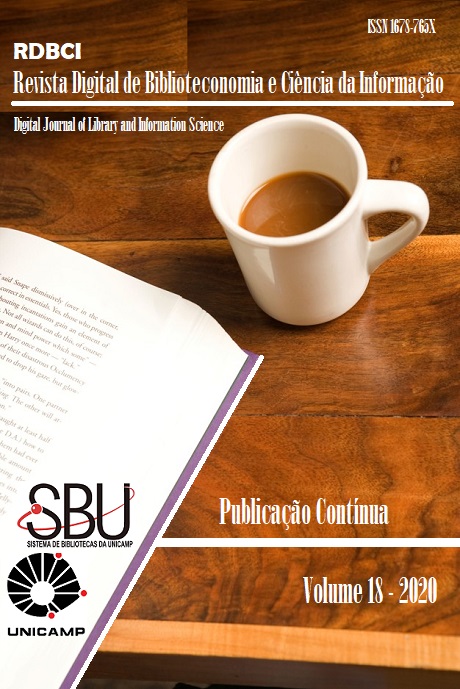Abstract
The growth of social networks and the way of representing their resources has become the subject of several studies in Information Science (IS). The digital image carries a difficulty in relation to its thematic representation in these social networks. Thus, the problem with this study is to investigate the retrieval of information on social networks, especially on networks that make available digital images. The objective is to analyze the contributions of the Knowledge Organization System - KOS - of the National Aeronautics and Space Administration - NASA, in the thematic representation of digital images made available on Flickr’s social networks. The exploratory and descriptive approach was used as methodology, which enabled the bibliographical review of theoretical aspects and the analysis of terminology in digital images at NASA’s Flickr. Therefore, the terms of non-controlled thematic representation described by folksonomies, and the controlled terms from the NASA thesaurus were analyzed. As results of the analysis, the challenges generated by the use of folksonomy in the thematic representation of digital images, and the advantages of using KOS in the processes of thematic representation and information retrieval in these environments are highlighted. It is concluded that folksonomies freely represent terms and reflect the terminological reality of a community, while KOS’ contribute to a control of vocabulary and more accurate information retrieval.
References
CARLAN, Eliana. Sistemas de organização do conhecimento: uma reflexão no contexto da Ciência da Informação. Brasília/DF: UNB, 2010. Disponível em: https://repositorio.unb.br/bitstream/10482/7465/1/2010_ElianaCarlan.pdf. Acesso em: 15 nov. 2018.
CARLAN, Eliana; MEDEIROS, Marisa Bräscher Basílio. Sistemas de organização do conhecimento na visão da Ciência da Informação. Revista Ibero-Americana de Ciência da Informação, Brasília, DF, v. 4, n. 2, p. 53-73, ago./dez. 2011. Disponível em: https://repositorio.unb.br/bitstream/10482/12867/1/ARTGO_SistemasOrganizacaoConhecimento.pdf. Acesso em: 22 nov. 2018.
CERVANTES, Brígida Maria Nogueira. A construção de tesauros com a integração de procedimentos terminográficos. Marília/SP: UNESP, 2009. Disponível em: https://www.marilia.unesp.br/Home/Pos-Graduacao/CienciadaInformacao/Dissertacoes/cervantes_bmn_do_mar.pdf. Acesso em: 22 nov. 2018.
DIAS, Eduardo Wense. Contexto digital e tratamento da informação. Rio de Janeiro: DataGramaZero - Revista de Ciência da Informação, 2001. Disponível em: http://www.brapci.inf.br/_repositorio/2010/01/pdf_8df58fec78_0007466.pdf. Acesso em: 20 jan. 2019.
FERNEDA, Edberto. Introdução aos modelos computacionais de recuperação de informação. Rio de Janeiro: Editora Ciência Moderna, 2012.
FERNEDA, Edberto. Recuperação de informação: análise sobre a contribuição da Ciência da Computação para a Ciência da Informação. 2003. Tese (Doutorado em Ciência da Informação e Documentação) - Escola de Comunicações e Artes, Universidade de São Paulo, São Paulo, 2003. doi:10.11606/T.27.2003.tde-15032004-130230. Disponível em: https://teses.usp.br/teses/disponiveis/27/27143/tde-15032004-130230/publico/Tese.pdf. Acesso em: 23 jan. 2019.
FERNEDA, Edberto; DIAS, Guilherme Ataíde. OntoSmart: um modelo de recuperação de informação baseado em ontologia. Perspectivas em Ciência da Informação, Belo Horizonte, v. 22, n. 2, p. 170-187, jun. 2017. ISSN 19815344. doi:http://dx.doi.org/10.1590/1981-5344/2081. Disponível em: http://portaldeperiodicos.eci.ufmg.br/index.php/pci/article/view/2081. Acesso em: 18 jan. 2019.
GUIMARÃES, José Augusto Chaves. Análise de domínio como perspectiva metodológica em organização da informação. Ciência da Informação, Brasília, v. 43, n. 1, june 2015. ISSN 1518-8353. Disponível em: http://revista.ibict.br/ciinf/article/view/1415 . Acesso em: 15 mai. 2020.
HASSAN-MONTERO, Yusef. Indización social y recuperación de información. No Solo Usabilidad Journal, 2006. Disponível em: http://www.nosolousabilidad.com/articulos/indizacion_social.htm. Acesso em: 16 jan. 2019.
HJØRLAND, Birger. Fundamentals of knowledge organization. Knowledge Organization, v. 30, n. 2. p. 87-111. Disponível em: http://ppggoc.eci.ufmg.br/downloads/bibliografia/Hjorland2003.pdf. Acesso em: 17 nov. 2018.
JACOB, Elin K. Ontologies and the semantic web. Bulletin of the American Society for Information Science and Technology, Apr./May, 2003. Disponível em: https://onlinelibrary.wiley.com/doi/pdf/10.1002/bult.283. Acesso em: 19 jan. 2019.
KURAMOTO, Hélio. Sintagmas Nominais: uma nova proposta para a recuperação de informação. DataGramaZero - Revista de Ciência da Informação, Rio de Janeiro, v.3, n.1, 2002. Disponível em: https://ridi.ibict.br/bitstream/123456789/150/1/KuraData2002.pdf. Acesso em: 16 jan. 2019.
LANCASTER, Frederick Wilfrid. Indexação e resumos: teoria e prática. 2. ed. Brasília/DF: Briquet de Lemos, 2004.
LIBEN-NOWELL, David; KLEINBERG, Jon. The link-prediction problem for social networks. Journal of the American Society for Information Science and Technology, v. 58, n. 7, p. 1019-1031, May, 2007.
SANTARÉM SEGUNDO, José Eduardo.; VIDOTTI, Silvana Aparecida Borsetti Gregorio. Representação iterativa e folksonomia assistida para repositórios digitais. Rio de Janeiro: Liinc em Revista, v.7, n.1, 2011. Disponível em: http://revista.ibict.br/liinc/article/view/3300/2916. Acesso em: 19 jan. 2019.
SILVA, Renata Eleuterio da; SANTOS, Renata Eleuterio da; FERNEDA, Edberto. Modelos de Recuperação de Informação e Web Semântica: a questão da relevância. Informação & Informação, João Pessoa, v. 18, n. 3, p. 27-44, out. 2013. ISSN 1981-8920. doi:http://dx.doi.org/10.5433/1981-8920.2013v18n3p27. Disponível em: http://www.uel.br/revistas/uel/index.php/informacao/article/view/12822. Acesso em: 17 dez. 2018.
SOUZA, Brisa Pozzi de. Representação Temática da Informação Documentária e sua Contextualização em Biblioteca. Revista Brasileira de Biblioteconomia e Documentação, São Paulo, v. 9, n. 2, p. 132-146, nov. 2013. ISSN 1980-6949. Disponível em: https://rbbd.febab.org.br/rbbd/article/view/249. Acesso em: 10 dez. 2018.
TRISTAO, Ana Maria Delazari; FACHIN, Gleisy Regina Bóries; ALARCON, Orestes Estevam. Sistemas de classificação facetados e tesauros: instrumentos para organização do conhecimento. Ci. Inf., Brasília, v. 33, n. 2, p. 161-171, agosto 2004. .https://doi.org/10.1590/S0100-19652004000200017. Disponível em: http://www.scielo.br/pdf/ci/v33n2/a17v33n2.pdf. Acesso em: 13 jan. 2019.
WAL, Thomas Vander. Folksonomy Definition and Wikipedia. 2005. Disponível em: http://www.vanderwal.net/random/entrysel.php?blog=1750. Acesso em: 17 jan. 2019.
WIKIPEDIA. Flickr. Disponível em https://pt.wikipedia.org/wiki/Flickr. Acesso em: 21 jan. 2019.

This work is licensed under a Creative Commons Attribution 4.0 International License.
Copyright (c) 2020 Danilo Camargo Dias, Walter Moreira, Rachel Cristina Vesu Alves






